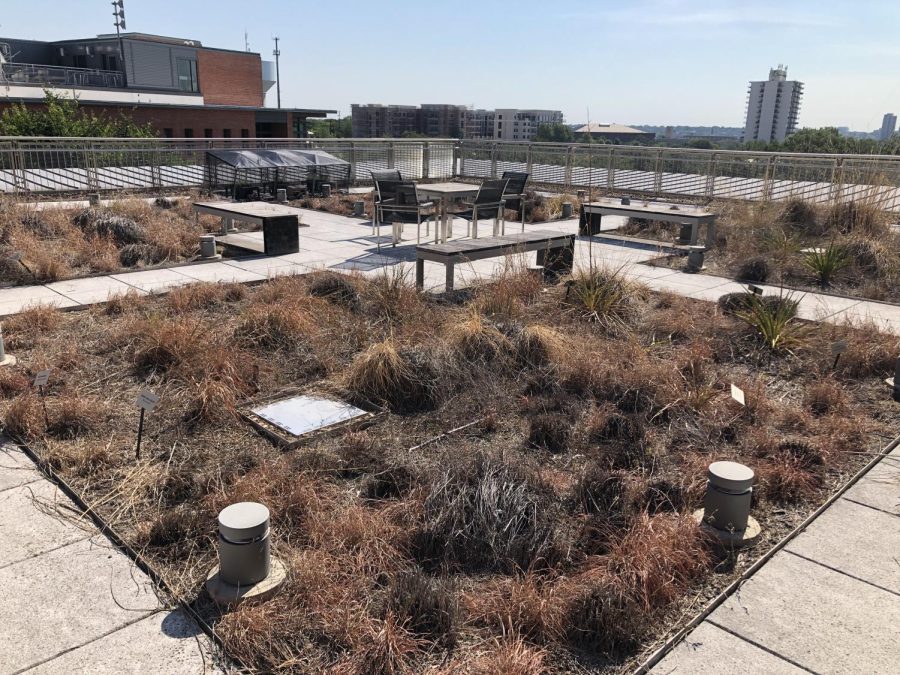The green façade of our red brick campus
Trinity has its work cut out to match the sustainable practices of peer institutions and regain its regional leadership status. It is up to students to fight for change.
One of Trinity’s most prevalent sustainability failures is the pervasive presence of single-use plastics on campus. Like the switch to recycled water for landscaping irrigation years ago, Trinity had a brief moment of sustainable wisdom installing refillable water stations in nearly all academic buildings and residence halls.
But the situation has only worsened. The Coates Student Center is particularly egregious with abysmal recycling and no expectation for vendors to minimize single-use plastics. Revolve restaurants endlessly churn out petroleum products and Starbucks whips up hundreds of drinks a day. While Starbucks is accepting reusable cups again, few of us have re-engaged and many students walk away with straws despite strawless lids. On top of this, in a strange cognitive dissonance, students often request free venti water with personal water bottles, unused, in backpacks.
A beacon of hope has been the commitment to reduce single-use plastic consumption at Mabee Dining Hall by using reusable dishes and utensils. The next hurdle is the thousands of pounds of pre and post-consumer food waste generated daily. Years ago, Mabee shut down their composting after complaints about smell and misuse, an issue easily addressed. To date, we have wasted tons of pre-and post-consumer food waste that could generate compost for local produce.
Another area for improvement is waste management. We have six different waste bins (mixed paper, office paper, plastic, aluminum, glass and landfill trash). Students have improved their ability to discern between these bins; however, there is only limited education and much of the waste still ends up incorrectly disposed of. I have heard from some students that they don’t bother to use the correct bins because they don’t believe the system works and even report seeing bags of recycling thrown into garbage trucks. City Vista doesn’t even have community recycling bins; they are told to leave their recyclable items outside their door but, likewise, many question the integrity of this system. It would take little communication on the part of the University to train students and assure them about the utility of these small gestures.
In stark contrast to Trinity’s sustainability failures, student groups are making a difference elsewhere on their own. A promising development has been a reinvigoration of the Trinity Community garden, co-operated by the Gardening in South Texas class and Gardening Club. Students are grateful for the support of the SGA (Student Government Association) and Academic Affairs, in particular AVPAA (Associate Vice Presidents of Academic Affairs), and David Ribble, who approved funding and permitted us to hire Stephen Lucke of Gardopia to guide the effort. Students removed invasive nandina, toxic to birds, from the bed near George M. Storch Memorial Building and planted native plants that are larval host plants or nectar sources for pollinators. They also rebuilt the raised beds to be larger, more stable, and aesthetically pleasing.
Additionally, the EcoAllies sub-committee EcoHabits intends to restore the Mabee garden, which has been neglected and out of use through COVID. These student-led efforts beautify the campus and provide a place for students to re-engage with food production and gardening.
Trinity is competing to become a nationally recognized liberal arts college, but our peer institutions are way ahead on sustainability. Middlebury, Wesleyan and Vassar Colleges are of similar size and academic rigor but have significantly better sustainability practices than Trinity. Middlebury became carbon-neutral in 2016 and committed to using 100% renewable energy by 2028. In 2009, Wesleyan developed an ecosystem services report for their campus land, including the carbon storage value of their trees. They track the number of recycled plastic water bottles per year, have set minimum and maximum temperatures in all campus buildings and have a “responsible purchasing policy” that requires the use of only energy-efficient appliances and environmentally-friendly products. Vassar has promised carbon neutrality by 2026 and created a climate action plan that aims for zero waste. In a rare and bold move, their Board of Trustees has also amended their investment policy to reflect their environmental protection values.
Trinity needs to take the following actions to become more sustainable:
Commitment to hiring dedicated staff and faculty
Engage with the STARS initiative (see “Trinity’s red bricks are greenwashed” from the Oct. 7 edition)
Adopt a climate action plan
Measure and reduce carbon footprint
Conduct regular trash and recycling audits





